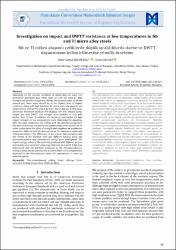| dc.contributor.author | Bölükbaşı, Ömer Saltuk | |
| dc.contributor.author | Keçeci, Cemre | |
| dc.date.accessioned | 2023-12-14T07:51:32Z | |
| dc.date.available | 2023-12-14T07:51:32Z | |
| dc.date.issued | 2023 | en_US |
| dc.identifier.citation | Bölükbaşı, O.S., Keçeci, C. (2023). Investigation on impact and DWTT resistance at low temperatures in Nb and Ti micro alloy steels. Pamukkale Üniversitesi Mühendislik Bilimleri Dergisi, 29(1), 86 - 93. doi: 10.5505/pajes.2022.06325 | en_US |
| dc.identifier.issn | 2147-5881 | |
| dc.identifier.issn | 1300-7009 | |
| dc.identifier.uri | https://dergipark.org.tr/tr/pub/pajes/issue/76027/1257529 | |
| dc.identifier.uri | https://hdl.handle.net/20.500.12508/2656 | |
| dc.description.abstract | Depending on the climatic conditions in which they are used, new generation petroleum pipe steels come up with the need for high strength and excellent toughness. During the transportation of oil and natural gas, these steels should be at the highest level of impact resistance along with high hardness. In recent years, the general test temperatures, such as 0oC, tend to be lower minus degrees. In this study; (American Petroleum Institute X70 Quality) API X70, impact, (drop-weight tear test) DWTT, and strength were modeled on rolls with thicker than 10 mm. In addition, the necessary parameters for high impact strength at low temperatures were determined by modeling. After the steel production and rolling with the specified parameters, mechanical tests and microstructure examinations were carried out. In order to determine the effect of strength and toughness on mechanical properties, different test sets were prepared for chemical analysis and rolling parameters. The differences in the product microstructure and test results of the titanium level and different holding times and thermomechanical and conventional rolling were investigated. The impact energy values of the materials produced with different process parameters were examined using large data sets. As a result, it has been determined that the particles produced by the thermomechanical rolling method and the particles are the most minor and homogeneously dispersed in the microstructure meet the expectations in terms of material quality. | en_US |
| dc.description.abstract | Yeni nesil petrol boru çelikleri, kullanıldıkları iklim koşullarına bağlı olarak yüksek mukavemet ve mükemmel tokluk ihtiyacı ile karşımıza çıkmaktadır. Petrol ve doğalgazın taşınması sırasında bu çeliklerin yüksek sertlik ile birlikte darbe dayanımının da en üst seviyede olması gerekmektedir. Son yıllarda, 0oC gibi genel test sıcaklıkları, eksi derecelerden daha düşük olma eğilimindedir. Bu çalışmada (American Petroleum Institute X70 Quality) API X70, darbe, (düşürme-ağırlığı yırtılma testi) DWTT ve mukavemet; 10 mm'den kalın rulolar üzerinde modellenmiştir. Ayrıca düşük sıcaklıklarda yüksek darbe dayanımı için gerekli parametreler modelleme ile belirlenmiştir. Belirtilen parametrelerde çelik üretimi ve haddeleme sonrasında mekanik testler ve mikroyapı incelemeleri yapılmıştır. Mukavemet ve tokluğun mekanik özellikler üzerindeki etkisini belirlemek için kimyasal analiz ve haddeleme parametreleri için farklı test setleri hazırlanmıştır. Titanyum seviyesi ve farklı bekletme süreleri ile termomekanik ve konvansiyonel haddelemenin mamul mikro yapı ve test sonuçlarında yarattığı farklılıklar araştırıldı. Farklı proses parametreleri ile üretilen malzemelerin darbe enerji değerleri büyük veri setleri kullanılarak incelenmiştir. Sonuç olarak termomekanik haddeleme yöntemi ile üretilen ve tanelerin en küçük ve mikro yapı içerisinde homojen dağılmış olanların malzeme kalitesi olarak beklentileri karşıladığı tespit edilmiştir. | en_US |
| dc.language.iso | eng | en_US |
| dc.publisher | Pamukkale Üniversitesi | en_US |
| dc.relation.isversionof | 10.5505/pajes.2022.06325 | en_US |
| dc.rights | info:eu-repo/semantics/openAccess | en_US |
| dc.subject | Thermomechanical rolling | en_US |
| dc.subject | Grain refining | en_US |
| dc.subject | Micro structure | en_US |
| dc.subject | Coiling temperature | en_US |
| dc.subject | Niobium effect | en_US |
| dc.subject | Termomekanik haddeleme | en_US |
| dc.subject | Tane inceltme | en_US |
| dc.subject | Mikro yapı | en_US |
| dc.subject | Sarılma sıcaklığı | en_US |
| dc.subject | Niyobyum etkisi | en_US |
| dc.subject.classification | Engineering & Materials Science - Metallurgical Engineering - Retained Austenite | |
| dc.subject.other | Pipeline steel | |
| dc.subject.other | Fracture | |
| dc.title | Investigation on impact and DWTT resistance at low temperatures in Nb and Ti micro alloy steels | en_US |
| dc.title.alternative | Nb ve Ti mikro alaşımlı çeliklerde düşük sıcaklıklarda darbe ve DWTT dayanımının iyileştirilmesine yönelik inceleme | en_US |
| dc.type | article | en_US |
| dc.relation.journal | Pamukkale Üniversitesi Mühendislik Bilimleri Dergisi | en_US |
| dc.relation.journal | Pamukkale University Journal of Engineering Sciences | |
| dc.contributor.department | Mühendislik ve Doğa Bilimleri Fakültesi -- Metalurji ve Malzeme Mühendisliği Bölümü | en_US |
| dc.identifier.volume | 29 | en_US |
| dc.identifier.issue | 1 | en_US |
| dc.identifier.startpage | 86 | en_US |
| dc.identifier.endpage | 93 | en_US |
| dc.relation.publicationcategory | Makale - Uluslararası Hakemli Dergi - Kurum Öğretim Elemanı | en_US |
| dc.contributor.isteauthor | Bölükbaşı, Ömer Saltuk | |
| dc.contributor.isteauthor | Keçeci, Cemre | |
| dc.relation.index | Web of Science - TR-Dizin | en_US |
| dc.relation.index | Web of Science Core Collection - Emerging Sources Citation Index | |
















